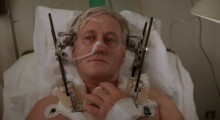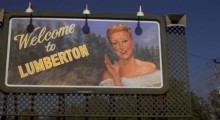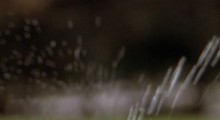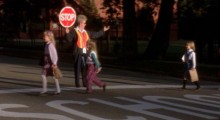The Blue Velvet Project
-
The Blue Velvet Project, #7

Second #329 Jeffrey’s father is in the hospital, from a scene whose unstable tone is a microcosm of the movie itself. On one level, this moment is almost painfully tender. Jeffrey’s father struggles to speak with him as Jeffrey looks on, helpless. Yet on another level, the scene feels almost like a parody of an As The World Turns hospital scene*, with the overdetermined nurse and doctor, who ushers Jeffrey into the room by the elbow. It’s as if Lynch stuffed every hospital-like contraption into the frame; Jeffrey’s father seems beset by many illnesses. Lynch holds the shot of the […]
by Nicholas Rombes on Aug 22, 2011 -
The Blue Velvet Project, #6

Second # 282 An establishing shot of downtown Lumberton/Wilmington, showing the courthouse (from the back) in the mid foreground. In the previous shot, we have just seen Jeffrey for the first time as he walks through the field, wearing black. He stops, picks up a stone, and throws it as some junk. He then keeps walking, his back to the camera. At this point, we don’t know who he is or where he’s going. That shot is followed by this, at second #282, a static shot that lasts three seconds. When I began this project I wondered how frequently frames […]
by Nicholas Rombes on Aug 19, 2011 -
The Blue Velvet Project, #5

Second #235 What is this? Where are we? In a weird, dreamlike echo of the Amity Island billboard (defaced with the black shark fin) from Jaws, the Welcome to Lumberton billboard is a nest of contradictions. Instead of a shark fin, there should be a monster lurking in the background pine trees. The woman looks to be freeze-dried straight out of the Cold War, and brings to mind Shelley Winters as Charlotte Haze in Stanley Kubrick’s Lolita (1962). Could the awkward wave of her hand be any more artificial or uninviting? For a moment, we seem to have gone back […]
by Nicholas Rombes on Aug 17, 2011 -
The Blue Velvet Project, #4

Second #188 Jeffrey’s father has just suffered a stroke while watering his front yard, and has fallen to his back, writhing in pain, the hose that he still holds—in a sad and funny and helpless way—spraying water all around. That shot is followed by this one, as the camera pans slowly down, the background a blur, capturing the water in mid-air as Bobby Vinton sings “Blue Velvet,” which he had released in 1963, several months before the assassination of John F. Kennedy. The song, written by Bernie Wayne and Lee Morris, dates back to 1950. Wayne was a prolific composer, […]
by Nicholas Rombes on Aug 15, 2011 -
The Blue Velvet Project, #3

Second #141 Some considerations: • Frederick Elmes’s lush, Freudian colors. • The hyper-red STOP sign, a warning to the audience? • The Eraserhead-like hair of the crossing guard. • The second and fourth child, carrying the same sort of brown paper lunch bag that Jeffrey would use later to transport the scissored ear to Detective Williams. • The cultishness of the film, already gathering in the open-furnace sky in the background. • The fact of SCHOOL taking up the entire lower-third of the screen, and the fact that Jeffrey is “home from school.” • The trust of children. • The […]
by Nicholas Rombes on Aug 12, 2011 -
The Blue Velvet Project, #2

Second #94: Lynch had been thinking about Blue Velvet since at least as early as 1973, and while his previous two films (Dune and Elephant Man) had been based on well-known stories, Blue Velvet was a return to the trembling, inner-psychic terrain of Eraserhead. In an earlier version of the script, Jeffrey’s mom and his Aunt Barbara pick him up from the airport after he’s forced to leave college because of the financial burden of his stricken father’s medical bills. As they drive into town, there is this exchange: AUNT BARBARA: They tore down the A & P, Jeffrey. Did […]
by Nicholas Rombes on Aug 10, 2011 -
The Blue Velvet Project, #1

And so we begin our year-long journey through Blue Velvet, stopping every 47 seconds. Although released in the U.S. in September 1986, the film lingered at the dark edges of the imagination until the spring of the following year, when it was released on home video by Karl-Lorimar. The rapid ascendency of the VCR and the proliferation of rental stores (in 1980 there were only approximately 2,500 rental stores in the U.S.; by 1987 this had increased to over 27,000) meant that Blue Velvet found its way into the very same sort of leafy small towns as Lumberton. The titles […]
by Nicholas Rombes on Aug 8, 2011







